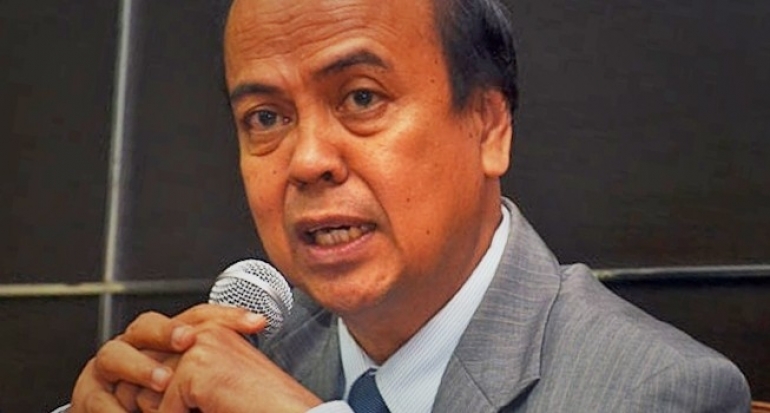By : Hafid Abbas
(Commissioner and Chairman of the Indonesian National Human Rights Commission 2012-2017, President of the Global Alliance of National Human Rights Institutions (GANHRI) in Southeast Asia 2014-2015)
For two decades, from the perspective of Western society, scientists, and observers of international politics, the issues of radicalism and extremism have often been associated with Muslims. This stereotype seems to have been influenced by President Bush’s policy of implementing a “black and white” foreign policy after the September 11, 2001, tragedy that destroyed the Twin Towers of New York, the pride symbol of the United States. When launching the anti-terrorism movement campaign, Bush stated: “Every nation in all regions everywhere, it’s time for you to make a decision. Will you be with us, or will you be with the terrorists? “
Indeed, at the launch of the Bush National Security Strategy in September 2002, Bush emphasized once again that we will not hesitate to act alone if necessary to exercise our right of self-defense by acting preemptively against such terrorists in order to prevent them from causing harm to our people and our country will not hesitate to act alone if necessary to exercise our right of self-defense by acting preemptively against such terrorists to prevent them from doing harm to our people and our country (pre-emptive strike) anywhere if there is a terrorist threat to the safety of our nation and country. “
Since then, the Islamic world has frequently been singled out and accused of being a breeding ground for radicalism and terrorism. The international community appears to have justified the US invasion of Afghanistan alongside its allies in October 2001 to destroy the Taliban administration, which is regarded as an Al-Qaeda supporter and is accused of being the perpetrator of the 9/11 tragedy. Similarly, when the same thing was done to invade Iraq and later overthrow President Saddam Husen, it was followed by an attack on Libya to depose President Moammar Gaddafi.
For the past two decades, the US and its allies have demonstrated their might in fighting the Islamic world on a daily basis. The Islamic world’s civilization has darkened, its image has been broken, and the loss and sacrifice of life and property for Muslims all over the world has resulted from the worldwide movement’s success in combating the issue of radicalism.
Indonesia, the country with the world’s largest Muslim population, is also a proponent of the worldwide movement.
The Influence of Polarization
Over the course of two decades, one of the consequences of the battle on radicalism and terrorism has been the world’s rivalry to raise their armaments expenditures. In 2007, the US defense expenditure, for example, had risen to almost $621.1 billion each year. Despite the fact that several groups estimate that the entire amount spent for the wars in Iraq and Afghanistan alone is expected to be $3 trillion (The Times, 23/2/2008).
Similarly, China and other developing countries have done the same with respect to the United States. China’s defense budget was $59 billion in 2007, although the Pentagon estimates it to be $97 to $139 billion per year, the world’s second highest after the United States (BBCNews, 4/3/2008). Pakistan, India, Middle Eastern countries, and Africa also allocate very large budgets in the field of weapons, while for humanity, such as education, it has decreased drastically. Pakistan, for example, has increased its military budget by more than 30 percent on average, while education has increased by only one percent (UNICEF, 2002).
As a result of the arms race, conflicts in the Middle East, a number of African countries, and South Asia appear to be spreading, and the poverty rate is rising. According to the World Bank (2021), only 17 of the 49 African countries reduced poverty rates between 2000 and 2020, despite rising social inequality. The reason for this is their rising emphasis on military spending and their lack of emphasis on human resource development, particularly education.
Another consequence of this polarization is that countries that have chosen the democratic path are perceived to be reverting to an authoritarian type of government. The Democracy Index 2006-2020 data shows a decrease in 163 nations worldwide, with a score of 5.52 in 2006 falling to 5.37 in 2020. The Middle Eastern and North African countries saw the greatest fall and the lowest scores, with only 3.34. Indonesia dropped from 6.41 to 6.30.
Western inconsistency
The US and the West have often criticized Indonesia when, in the New Order era, it had a number of laws and regulations that were considered very oppressive and deprived its citizens of freedom of expression and contradicted human rights principles. Since the end of the New Order era, such laws have been annulled because, since 1998, Indonesia has chosen the path of democracy. However, such laws are still widely used in Singapore, Malaysia, and other neighboring countries.
While the United States is assembling a global coalition to combat terrorism, Indonesia is under pressure to return to the old system under the pretense of combating terrorism. As Director General of Human Rights at the Ministry of Justice and Human Rights of the Republic of Indonesia at the time, we were aware of the US government’s tremendous temptation and pressure on Indonesia to return to an authoritarian age.
When accompanying the Republic of Indonesia’s Minister of Justice and Human Rights, Yusril Ihza Mahendra, to his meeting with US Attorney General John David Ashcroft in early 2003 in Washington, it was stated that if Indonesia re-enacts oppressive laws and regulations, it will kill its own democratization process (suicide of a democracy). This is a real manifestation of the Western world’s inconsistencies and “fascinating” attitude toward achieving its goals.
Diverse Regrets and Motives for the Iraqi Invasion
On October 25, 2015, CNN published an interview with Tony Blair expressing regret and apologies for the US and allied invasion of Iraq, stating: “I apologize for the fact that we have received intelligence reports that wrongly accused Iraq of using chemical weapons extensively to attack its own population and others.” Our suspicions turned out to be incorrect. I also apologize for any mistakes in planning, and especially for our miscalculation of what would happen after dropping Saddam Hussein’s regime. “
In an interview with Fox News on April 10, 2016, President Barack Obama also conveyed his regrets and apologies. “The United States is very regretful,” he said, “and as President, this is the largest (worst) mistake I have made in my administration, attacking Libya and overthrowing President Muammar Gaddafi without sufficient planning following the strike.” As a result, Libya is entirely unorganized, and violent extremists remain a menace.
Another admission that has alarmed the international community is Donald Trump’s claim in his campaign in Florida on August 11, 2016, that Obama and Hillary were co-founders of the Islamic State of Iraq and Syria, or ISIS (The Guardian, 11/8/2016). This is done in order to split and put the Islamic world against itself.
Iraq has a population of 33 million (2016), but it produces 5.3 million barrels of oil per day (2017), with output predicted to climb to 8 million barrels per day by 2027 (Reuter, 10/8/2021). However, this natural richness does not appear to give the best possible benefits to its residents. Prior to the US and its allies’ invasion of Iraq, the country’s enormous oil production was self-regulated by not allowing any cooperation with US and Western oil corporations. Only after the invasion did President Bush put pressure on the Iraqi government to pass legislation allowing international oil corporations to operate in Iraq (CNN, 15/04/2013).
According to the CNN analysis, the reason for the conflict in Iraq is to control its oil.
If Iraq produces 8 million barrels of oil per day in the near future, compare that to Indonesia, which has a population of roughly 272 million people and produces just about 420,000 barrels per day (Jakarta Globe, 11/12/2020).
These are some of the facts of the last two decades’ dynamics in the West’s relationship with the Islamic world.



